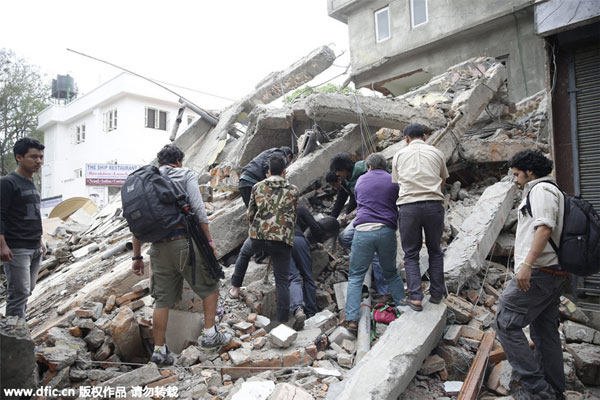 |
|
People search for survivors in the rubble of a destroyed building after an earthquake in Kathmandu, Nepal. [Photo/IC] |
While the trigger of the disaster is natural _ an earthquake _ "the consequences are very much man-made," Jackson said. Except for landslides, which in this case are a serious problem, "it's buildings that kill people not earthquakes," Jackson said. If you lived in a flat desert with no water, an earthquake wouldn't harm you, but then few people want to live there.
"The real problem in Asia is how people have concentrated in dangerous places," Jackson said.
Kathmandu was warned, first by the Earth itself: this is the fifth significant quake there in the last 205 years, including the massive 1934 one.
"They knew they had a problem but it was so large they didn't where to start, how to start," said Hari Ghi, southeast Asia regional coordinator for Geohazards International, a group that works on worldwide quake risks. Ghi, Jackson and Wald said Nepal was making progress on reducing its vulnerability to earthquakes, but not quickly or big enough.
Ghi's group on April 12 updated a late 1990s report summarizing the Kathmandu Valley risks.
"With an annual population growth rate of 6.5 percent and one of the highest urban densities in the world, the 1.5 million people living in the Kathmandu Valley were clearly facing a serious and growing earthquake risk," the report said, laying out "the problem" the valley faces. "It was also clear that the next large earthquake to strike near the Valley would cause significantly greater loss of life, structural damage, and economic hardship than past earthquakes had inflicted."
And for years there were no building codes and rampant development so homes and other structures could be built without any regards to earthquakes, the report said. There are now building codes, but that doesn't help the older structures, and the codes aren't overly strong, Ghi said.
It's actually even made worse because of local inheritance laws that require property be split equally among all sons, Jackson said. So that means buildings are split vertically among brothers making very thin rickety homes that need more space so people add insecure living space on additional floors, he said.
"The construction is appalling in Kathmandu," Jackson said.
Poverty and pollution make the problem worse, Jackson said. That's because people don't spend time worrying about some future earthquake because they have more pressing problems.
"If you live in the Kathmandu Valley you have other priorities, daily threats and daily nasty things happen to you in terms of air quality, water quality, pollution, traffic and just poverty," Jackson said. "But it doesn't mean that the earthquakes go away."